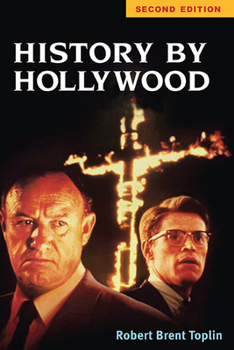History by Hollywood, Second Edition
Select Format
Select Condition 
Book Overview
This newly updated edition of History by Hollywood explores the question of what happens to history when Hollywood filmmakers get their hands on it. With a fresh look at recent films and television productions such as Titanic, Pearl Harbor, The Patriot, and John Adams, Robert Brent Toplin examines how filmmakers have interpreted American history through their movies. Toplin discusses how writers, producers, and directors become involved in making...
Format:Paperback
Language:English
ISBN:0252076893
ISBN13:9780252076893
Release Date:February 2010
Publisher:University of Illinois Press
Length:280 Pages
Weight:1.05 lbs.
Dimensions:0.8" x 5.9" x 8.9"
Customer Reviews
2 ratings
Useful Case Studies of Individual Films and How They Depict American History
Published by Thriftbooks.com User , 18 years ago
Historians are uniformly condemnatory of most feature films that seeking to depict history events. Almost never are they accurate in any serious manner, even if they costume the cast appropriately for the time and place. "Gods and Generals," "Titanic," and "The Patriot" suggest that even when attention to detail prevails it often yields a false impression of the past. This is particularly unnerving to most historians because of the power of the medium to shape popular conceptions of historical events. In "History by Hollywood" Robert Brent Toplin offers a detailed analysis of how film makers "tell the story of real people and actual events from American history" (p. 1). While allowing that film makers should be allowed "dramatic license," Toplin insists that they do so in a responsible manner that seeks to understand rather than reinvent the past. Toplin uses eight case studies to demonstrate how film makers have dealt with American history since the 1940s. In terms of release, the earliest film Toplin discusses is "Sergeant York," made in 1941 and it receives his plaudits for historical accuracy while also drawing important lessons for the present. Likewise, "Patton" (1970) draws powerful lessons from the World War II experience of the charismatic and eccentric Army officer applicable to the Vietnam experience of the 1960s and early 1970s. Toplin finds that "All the President's Men" (1976) and "Norma Rae" (1979) also exhibit a high commitment to historical accuracy, despite some liberties taken, and serve well as means of educating the present about threats to democratic institutions or worker rights. The remaining four films raise other issues. "Bonnie and Clyde" (1967) and "Missing" (1982) both take important liberties with the historical record to make points about the present and to indict the U.S. government for crimes real and imagined. At the same time Toplin finds those films useful entrée points for those engaged in historical investigation of weighty issues. Finally, Toplin analyzes "Mississippi Burning" (1988) and "JFK" (1991) and finds both fatally flawed as history. Both raised important points about the events they depict but left a false impression of them in the minds of viewers. Robert Brent Toplin is more magnanimous in assessing these films than I would be. With the exception of "Patton" and "Norma Rae" I am less kind in my assessments of these eight films. In some instances, such as "All the President's Men" and "JFK," the films create an utterly false impression of what took place. In the case of "All the President's Men" only the two Washington Post writers, Bob Woodward and Carl Bernstein, are seen as battling the forces of the administration, although several others such as Tip O'Neill and Judge John Sirica played key roles. "JFK," of course, promulgated a massive conspiracy of the military-industrial complex in the assassination of the president in 1963 when evidence is lacking supporting such an assertion. This is
Excellent synthesis of history and film criticism.
Published by Thriftbooks.com User , 26 years ago
How does Hollywood distort history? Toplin, a history professor at the University of North Carolina, describes four of Hollywood's principal methods of treating (or mistreating) history: mixing fact with fiction, shaping evidence to deliver specific conclusions, suggesting messages for the present in stories about the past, and fabricating a documentary style to develop the "Great Man" perspective on the past. The techniques are employed in works as varied as "Bonnie and Clyde", " Sergeant York", and Oliver (I-don't-have-to-tell-the-truth-I'm-an-artist) Stone's "JFK", but while Toplin (naturally) respects historical accuracy, he acknowledges the narrative and dramatic necessities which inevitably contaminate the historical reality. He also notes special interest pressures to have movies reflect particular interpretations, and the film-makers' responses to criticisms of their historical veracity. A worthwhile look at some of Hollywood's reconstructions of the past, and their connections to larger issues. (The "score" rating is an ineradicable feature of the page. This reviewer does not "score' books).






